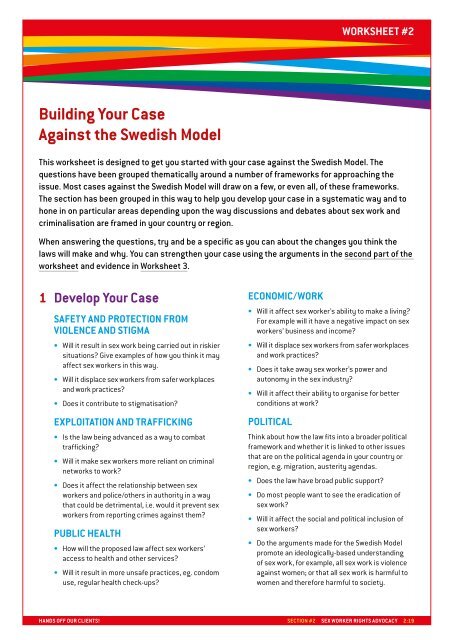hands-off-our-clients-worksheets
hands-off-our-clients-worksheets
hands-off-our-clients-worksheets
Create successful ePaper yourself
Turn your PDF publications into a flip-book with our unique Google optimized e-Paper software.
WORKSHEET #2<br />
Building Y<strong>our</strong> Case<br />
Against the Swedish Model<br />
This worksheet is designed to get you started with y<strong>our</strong> case against the Swedish Model. The<br />
questions have been grouped thematically around a number of frameworks for approaching the<br />
issue. Most cases against the Swedish Model will draw on a few, or even all, of these frameworks.<br />
The section has been grouped in this way to help you develop y<strong>our</strong> case in a systematic way and to<br />
hone in on particular areas depending upon the way discussions and debates about sex work and<br />
criminalisation are framed in y<strong>our</strong> country or region.<br />
When answering the questions, try and be a specific as you can about the changes you think the<br />
laws will make and why. You can strengthen y<strong>our</strong> case using the arguments in the second part of the<br />
worksheet and evidence in Worksheet 3.<br />
1 Develop Y<strong>our</strong> Case<br />
Safety And Protection from<br />
Violence and Stigma<br />
• Will it result in sex work being carried out in riskier<br />
situations? Give examples of how you think it may<br />
affect sex workers in this way.<br />
• Will it displace sex workers from safer workplaces<br />
and work practices?<br />
• Does it contribute to stigmatisation?<br />
Exploitation and Trafficking<br />
• Is the law being advanced as a way to combat<br />
trafficking?<br />
• Will it make sex workers more reliant on criminal<br />
networks to work?<br />
• Does it affect the relationship between sex<br />
workers and police/others in authority in a way<br />
that could be detrimental, i.e. would it prevent sex<br />
workers from reporting crimes against them?<br />
Public Health<br />
• How will the proposed law affect sex workers’<br />
access to health and other services?<br />
• Will it result in more unsafe practices, eg. condom<br />
use, regular health check-ups?<br />
Economic/Work<br />
• Will it affect sex worker’s ability to make a living?<br />
For example will it have a negative impact on sex<br />
workers’ business and income?<br />
• Will it displace sex workers from safer workplaces<br />
and work practices?<br />
• Does it take away sex worker’s power and<br />
autonomy in the sex industry?<br />
• Will it affect their ability to organise for better<br />
conditions at work?<br />
Political<br />
Think about how the law fits into a broader political<br />
framework and whether it is linked to other issues<br />
that are on the political agenda in y<strong>our</strong> country or<br />
region, e.g. migration, austerity agendas.<br />
• Does the law have broad public support?<br />
• Do most people want to see the eradication of<br />
sex work?<br />
• Will it affect the social and political inclusion of<br />
sex workers?<br />
• Do the arguments made for the Swedish Model<br />
promote an ideologically-based understanding<br />
of sex work, for example, all sex work is violence<br />
against women; or that all sex work is harmful to<br />
women and therefore harmful to society.<br />
Hands <strong>off</strong> <strong>our</strong> <strong>clients</strong>! Section #2 Sex worker rights advocacy 2:19


